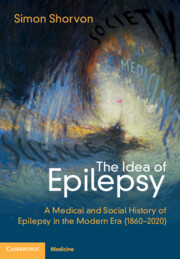Book contents
- The Idea of Epilepsy
- The Idea of Epilepsy
- Copyright page
- Dedication
- Contents
- Preface
- Section 1 The Voyage Of The Good Ship Epilepsy
- Introduction
- Prologue A Note on the Concept – the Idea – of Epilepsy
- Section 2 ‘A Plague upon Your Epileptic Visage’
- Section 3 Epilepsy: The Paradigm of the Suffering of Both Body and Soul in Disease
- Book part
- Glossary
- Bibliography
- Index of Names
- Index
Prologue - A Note on the Concept – the Idea – of Epilepsy
from Section 1 - The Voyage Of The Good Ship Epilepsy
Published online by Cambridge University Press: 13 January 2023
- The Idea of Epilepsy
- The Idea of Epilepsy
- Copyright page
- Dedication
- Contents
- Preface
- Section 1 The Voyage Of The Good Ship Epilepsy
- Introduction
- Prologue A Note on the Concept – the Idea – of Epilepsy
- Section 2 ‘A Plague upon Your Epileptic Visage’
- Section 3 Epilepsy: The Paradigm of the Suffering of Both Body and Soul in Disease
- Book part
- Glossary
- Bibliography
- Index of Names
- Index
Summary
The concept of epilepsy, its meaning and its signification, transcend any simple medical definitions, and have changed remarkably over the course of the twentieth century. This is not to say that the physical manifestations have changed – they have not; but the idea of epilepsy has radically altered. Epilepsy in 2020 would be completely unrecognisable to any citizen, doctor or patient of 1860, 1900, or indeed later. Four points are especially relevant to the changing concept: whether epilepsy is perceived as a disease or a symptom; whether epilepsy is explicable as a functional mental disorder or an organic neurological disorder; whether epilepsy has other inherent features apart from seizure; and whether epilepsy is an inherited disorder. The pendulum on these points has swung violently during the course of this history. Finally, there is the question of whether epilepsy should be considered to still exist. Although it clearly is an outmoded concept from the medical and scientific perspective, in many societal and personal settings it has utility as a shorthand describing the liability of a person to have epileptic seizures. It is a term though that comes also with the baggage of history, prejudice and much unhappiness.
Keywords
- Type
- Chapter
- Information
- The Idea of EpilepsyA Medical and Social History of Epilepsy in the Modern Era (1860–2020), pp. 16 - 26Publisher: Cambridge University PressPrint publication year: 2023



